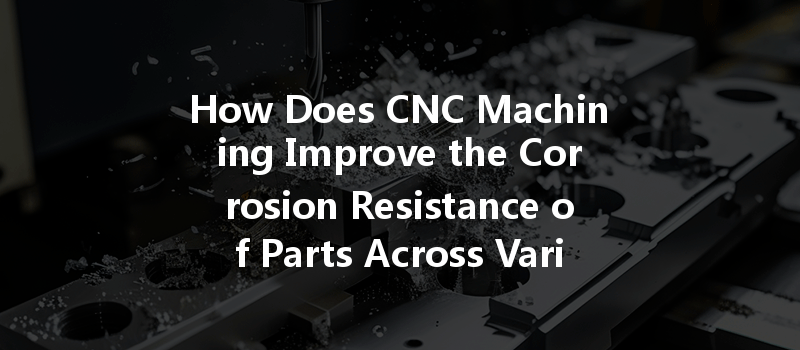Did you know that over 80% of engineers consider corrosion resistance one of the top priorities when selecting materials for product design? As industries increasingly demand durable components that can withstand harsh environments, CNC machining has emerged as a crucial technology in addressing corrosion resistance in machined parts. In today’s blog, we will explore the significant interplay between CNC machining and corrosion resistance, breaking down how this technology enhances the longevity of components across various industries.
Understanding Corrosion: The Enemy of Durability
Before delving into CNC machining’s impact on corrosion resistance, it’s essential to understand what corrosion actually is. Corrosion refers to the gradual destruction of materials, typically metals, due to chemical reactions with their environment. This process can lead to catastrophic failures, increased maintenance costs, and material waste.
Types of Corrosion
Understanding these types will help us appreciate how CNC machining can play a pivotal role in mitigating their effects.
The Role of CNC Machining in Enhancing Corrosion Resistance
One of the critical aspects CNC machining offers is the ability to select materials specifically tailored to resist corrosion. Some commonly used materials with excellent corrosion resistance properties include:
By using CNC technology, manufacturers can precisely machine these materials, ensuring the end product meets specific corrosion resistance requirements.
The surface of a machined part is where corrosion often begins. CNC machining allows for a variety of surface treatments that enhance corrosion resistance:
These treatments can be effectively applied through CNC machining processes, ensuring that parts have the optimal surface finish for corrosion resistance.
The precision achieved through CNC machining plays a vital role in enhancing the performance and durability of parts. Precise machining minimizes gaps and uneven surfaces, which are prime locations for corrosive agents to accumulate. For instance, ensuring tight tolerances and seamless connections can prevent water and chemicals from entering crevices, significantly reducing the risk of crevice corrosion.
The ability to customize components via CNC machining means manufacturers can design parts tailored to resist specific types of corrosion relevant to their industry. For example, in the marine industry, parts may need to withstand saltwater exposure, so engineers can select corrosion-resistant materials and processes specifically for that environment. This customization enables optimal performance under various conditions.
CNC machining facilitates rigorous quality control protocols. With automated inspections and monitoring during production, manufacturers can ensure that the surface treatments and materials are applied correctly to resist corrosion. Having this level of oversight ensures the final components will withstand their intended environmental stresses.

Industry Applications
As we’ve seen, CNC machining has a significant impact on corrosion resistance. But how does this translate to real-world applications across different industries? Here are some noteworthy examples:
Aerospace
In aerospace, components are subjected to extreme conditions, including temperature fluctuations and exposure to corrosive fluids. CNC machining allows manufacturers to create lightweight yet incredibly strong parts, such as turbine blades made from advanced alloys, optimized for high corrosion resistance.
Automotive
Corrosion can significantly affect vehicle performance and safety. Components like exhaust systems, engine parts, and frames undergo CNC machining with specific materials and surface treatments to ensure longevity in various environmental conditions, from road salt to humidity.
Oil and Gas
The oil and gas industry faces some of the most challenging corrosive environments. CNC machining is used to produce specialized valves, pumps, and pipelines made of alloys designed to withstand extreme pressure and corrosive agents, ensuring safety and operational efficiency.
Medical Devices
Corrosion resistance is of utmost importance in medical devices, where materials come into contact with bodily fluids. CNC machining allows for precision parts fabricated from biocompatible, corrosion-resistant materials, ensuring the safety and reliability of these devices.
Electronics
In electronics, corrosion can lead to failures and reduced product life. CNC machining is employed to create enclosures and components that protect sensitive electronics from moisture and corrosive elements, enhancing their durability.
Advanced Techniques Enhancing Corrosion Resistance
Advanced electrochemical treatments like anodization and passivation create protective layers on metal surfaces. Understanding these innovations within the CNC machining domain allows manufacturers to significantly improve corrosion resistance.
Recent developments in nanotechnology enable the creation of coatings that resist corrosion on a molecular level. Implementing these coatings during CNC machining can lead to innovative solutions for industries with specific corrosion challenges.
Hybrid manufacturing combines CNC machining with additive manufacturing processes. This allows for intricate designs that maximize performance while incorporating corrosion-resistant materials where necessary.
Cost Implications of Corrosion Resistance Mechanisms
While enhancing corrosion resistance through CNC machining can incur initial costs, the long-term benefits significantly outweigh these expenses.
CNC machining plays a pivotal role in combating corrosion across various industries, incorporating advanced material selection, surface treatments, precision engineering, customization, and quality control. By focusing on the need for corrosion-resistant components, manufacturers can create durable parts that withstand harsh environments, ranging from aerospace to medical devices.
As we’ve explored in this comprehensive blog, the techniques and technologies used in CNC machining facilitate improved corrosion resistance that enhances not only the operational lifespan of parts but also their performance. The initial costs associated with these processes often yield significant long-term savings and compliance benefits.
In summary, as industries face increasingly stringent demands for durability and performance, understanding the connection between CNC machining and corrosion resistance is essential. It invites innovation and sustainable practices that not only protect investments but also promote product safety and reliability. As you explore your next projects, consider the importance of corrosion resistance and how CNC machining presents solutions worth investing in—your longevity and success depend on it.






